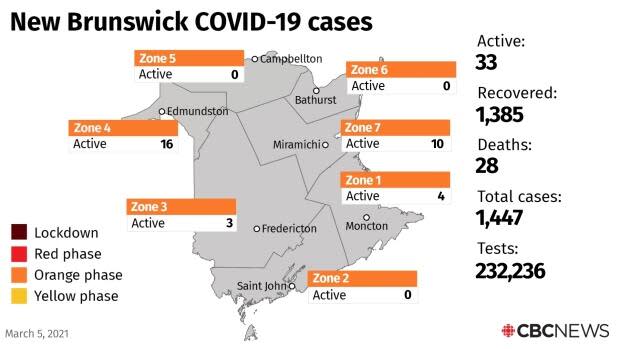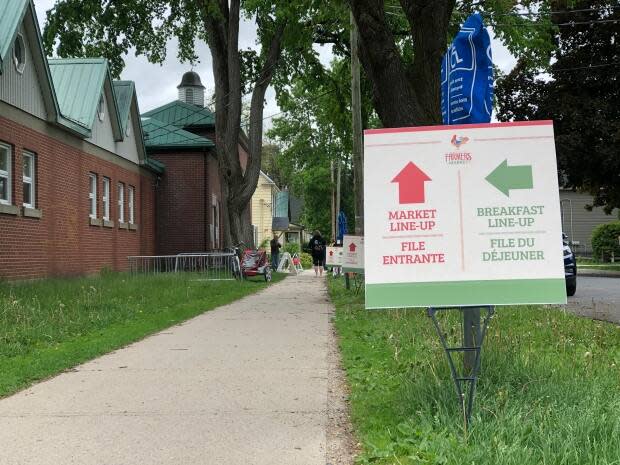N.B. COVID-19 roundup: All zones to go yellow, all residents could have 1st dose by summer

New Brunswick's seven zones are set to move to the yellow phase of recovery on Sunday night at midnight.
Dr. Jennifer Russell, the chief medical officer of health, made the announcement at a live-streamed briefing, noting "Good things come to those who wait."
However, Russell expressed concern about the virus's spread in Zone 7, which has seen rising case numbers and the confirmation of a B117 variant case, and said she'll be keeping "a close eye" on the situation.
"If there is a significant change over the weekend, we will revisit the decision," she said. "We have a lot of tests that we're waiting for results of, but as of now, the Miramichi region will move to the yellow phase along with the rest of the province."
She advised New Brunswickers to avoid unnecessary travel in and out of the region, and extended walk-in testing for another day. Testing will continue Saturday at Dr. Losier Middle School, 124 Henderson St. in Miramichi, from 11 a.m. to 7 p.m.
There have been 776 asymptomatic tests conducted at the clinic so far, and all of the results received have been negative.
"We are going to be watching very closely over the weekend as more of those test results come in," Russell said.
But while Zone 7 is "the biggest concern," she said all zones will be on watch this weekend.
"There were some people who were contagious prior to March break who may or may not have travelled out of the zone. So I will be concerned about cases popping up anywhere and everywhere in the next several days."
Horizon Health made the wait for testing a little easier Friday when it opened up a wing of the school so that people didn't have to line up in the cold outside. As happened Thursday, hundreds of people took advantage of the walk-in testing.

A slightly different shade of yellow
The province is poised to move to the yellow phase of recovery at 11:59 Sunday, March 7, but there have been some changes to previous yellow phase rules, Dr. Jennifer Russell said Friday. The previously announced changes include:
Residents will be allowed to expand their steady 10 to a steady 15 contacts. The steady 15 may visit venues together, including restaurants.
Sports teams will be allowed to play within their leagues across zones, while following their operational plans.
Formal indoor gatherings will be allowed with an operational plan, at 50 per cent capacity or less.
Formal and informal outdoor gatherings of 50 people or fewer will be allowed with physical distancing.
Masks will still have to be worn in indoor spaces but will not be needed outdoors.
Mask-wearing in schools will depend on the school's operational plan.
Public Transit can operate at full ridership with the continuous use of a mask.
Further details about the updated yellow level are available on the government's gnb.ca website.

All residents could get first vaccine dose by summer
Public Health will revisit the province's COVID-19 rollout plan based on new advice from the National Advisory Council on Immunization, Dr. Jennifer Russell said Friday.
The council said this week that the second dose can safely be delayed by up to 120 days.
Based on this advice, Russell said, Public Health is now considering extending the gap between the first and second dose to 120 days from a previously planned 90 days.
A ramped-up vaccine supply will also factor into the revised rollout plan.
New Brunswick will receive its first shipment of the recently approved AstraZeneca-Oxford vaccine, which does not require ultra-cold freezers, in March, Russell said.
"With this new guidance on delaying the second dose and a steady supply of vaccines, it is my hope that we will be able to provide at least one dose to New Brunswickers before summer begins."
Four new cases in two zones
Four new cases have been reported in New Brunswick on Friday. The cases break down in this way:
Fredericton region, Zone 3:
one new case
Miramichi region, Zone 7:
three new cases
All of the cases are self-isolating.
The number of confirmed cases in New Brunswick is 1,447. Since Thursday, seven people have recovered for a total of 1,385 recoveries.
There have been 28 deaths, and the number of active cases is 33. Three patients are hospitalized and two are in intensive care.
A total of 232,236 tests have been conducted, including 929 since Thursday's report.

COVID restrictions put damper on normally lively market
A longtime vendor is raising concerns about the viability of the Fredericton farmers' market as COVID-19 restrictions continue.
A once-bustling Saturday tradition, the Boyce market has had to implement strict capacity restrictions to stay open.
Vendor Butch Dalton says the market can only accommodate 80 people at a time.
"We're just having trouble getting the people in the building," said Dalton. "It's not that there aren't patrons. It's just that we've got a limited capacity now due to COVID."
The restrictions have definitely had an effect on the atmosphere, Dalton said.
"You walk into the market [and it] seems very empty. Just a little bit tough in that respect."
Dalton said that when the market was allowed to reopen last June, every vendor had to have an operational plan approved by WorkSafeNB.
But the province asked the market to put in further safeguards in January, such as having Plexiglas separating every market stall.
He said it feels like the market is being held to a higher standard than other places that sell food, such as grocery stores.
"I don't know if you've been to the Superstore or similar on a Friday afternoon, but I mean, those places are still very much more busy than the market is allowed to be," said Dalton.
"That's had a huge impact on the vendors in terms of being able to have the appropriate number of customers so that we can, you know, make an honest living down there."
Dalton said the past year has been a challenge for many market vendors and they're hoping the arrival of vaccines will bring an uptick in business.
Until then, Dalton said, the market is asking patrons to come in, but don't stay too long.
"I know there's a social component to the market … but what we're encouraging people to do is to come buy their goods, you know, carry on," he said. "So we're not creating lineups. So that we're not having long conversations with people."
Retired doctor questions vaccine rollout priorities
A retired internist in Edmundston is calling on Public Health to reverse its decision to vaccinate people in their teens and early 20s before those in their 60s.
New Brunswick is vaccinating people 85 and over. It will begin vaccinating people 70 to 84 after that, and then will turn to the 16-to-25 age group in June. People in their 60s won't be eligible for vaccinations until July.
"There was absolutely no logic to it," said Dr. Paul Clavette.
Health Minister Dorothy Shephard has said the province chose to vaccinate younger people before those in their 60s because the younger group is more likely to be out spreading the coronavirus.
But Clavette said people his age should be getting the COVID-19 vaccine long before people in their teens to early 20s.
"There's no place in the world right now where they vaccinate the younger before the older."
The Public Health Agency of Canada says most people requiring care in intensive care units are between 60 and 69.
The age group also has the third highest deaths at nearly 1,700 deaths -- behind people in their 70s and 80s.
Public exposure notifications
Public Health has identified a positive case in a traveller who may have been infectious while on the following flight:
Air Canada flight 8906 on Feb. 20, from Montreal to Moncton, departed at 7:10 p.m.
This week, Public Health issued a list of potential public exposures in the Miramichi region, Zone 7. Individuals who tested positive were in these establishments. Publish Health said it doesn't have the exact times these people were in the businesses on the list, "but it is believed it was for a short duration on these dates."
Sobeys on Feb. 14, Feb. 19, Feb. 24 and Feb. 25 (273 Pleasant St., Miramichi).
Atlantic Superstore on Feb. 14, Feb. 23 and Feb. 28 (408 King George Hwy., Miramichi).
Shoppers Drug Mart on Feb. 14, Feb. 17 and Feb. 26 (397 King George Hwy., Miramichi).
Dollarama on Feb. 20 (100 Douglastown Blvd., Miramichi).
Winners on Feb. 22 and Feb. 24 (2441 King George Hwy., Miramichi).
Giant Tiger on Feb. 24 (2441 King George Hwy., Miramichi).
Walmart on Feb. 24 (200 Douglastown Blvd., Miramichi).
Bulk Barn on Feb. 27 (100-99 Douglastown Blvd., Miramichi).
NB Liquor on Feb. 27 (221 Pleasant St., Miramichi).
What to do if you have a symptom
People concerned they might have COVID-19 symptoms can take a self-assessment test online.
Public Health says symptoms shown by people with COVID-19 have included:
A fever above 38 C.
A new cough or worsening chronic cough.
Sore throat.
Runny nose.
Headache.
New onset of fatigue, muscle pain, diarrhea, loss of sense of taste or smell.
Difficulty breathing.
In children, symptoms have also included purple markings on the fingers and toes.
People with one of those symptoms should:
Stay at home.
Call Tele-Care 811 or their doctor.
Describe symptoms and travel history.
Follow instructions.

